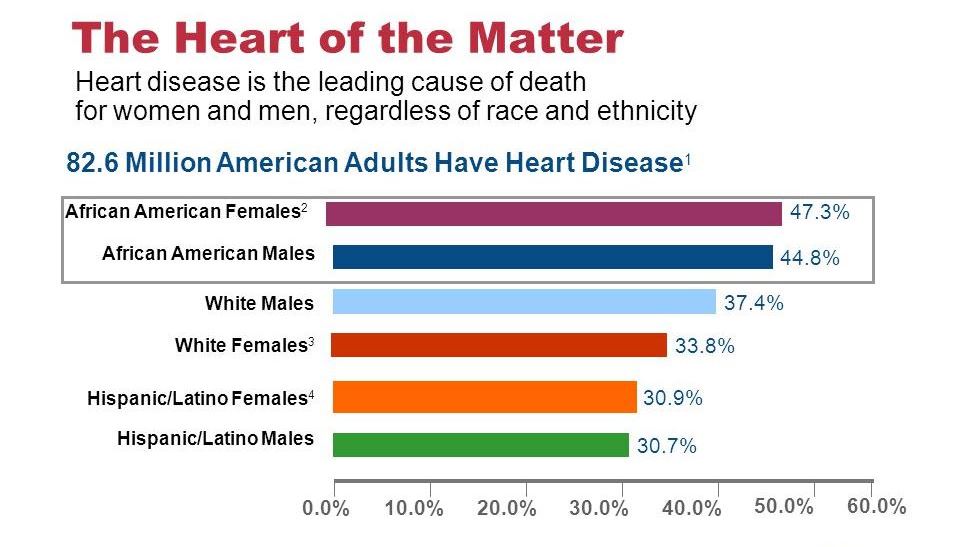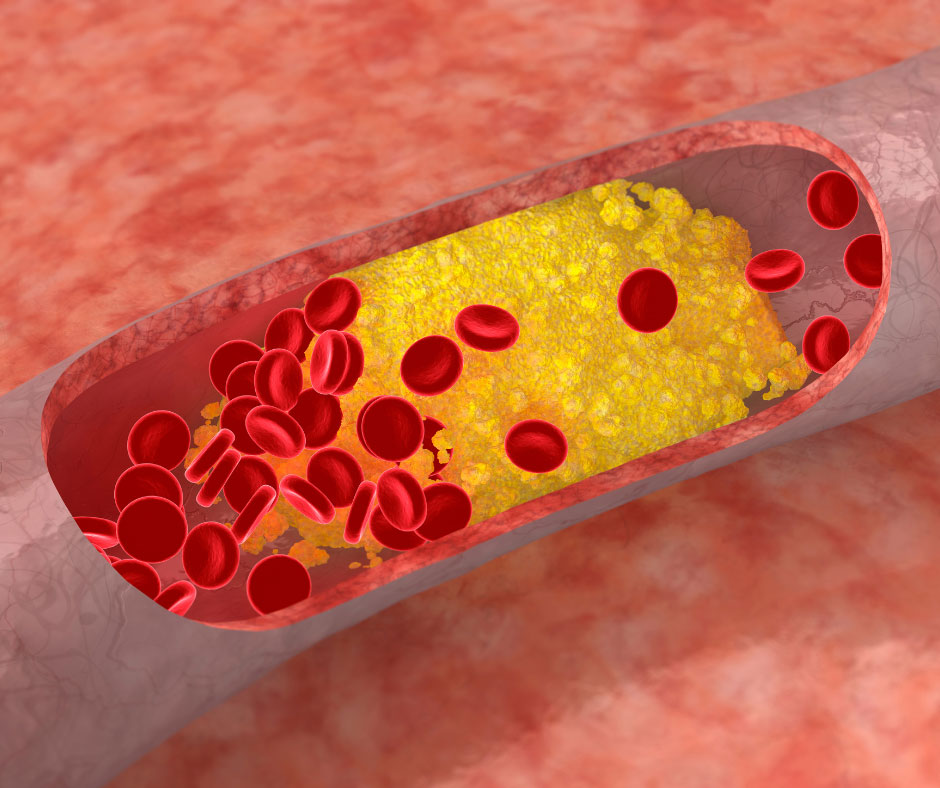Heart disease is the leading cause of death for all Americans, but certain minority groups face a greater risk than others. Deaths from heart disease are higher in black Americans than in white Americans and other ethnic groups, and heart disease develops at a younger age in African Americans. Nearly 48% of African American women and 44% of African American men have some form of heart disease. Research has found that even among the growing middle- and upper-class black community, the rate of heart disease among black Americans is still greater than in white Americans who have a comparable socioeconomic status. The most common conditions that increase the risk of heart disease and stroke among black Americans are high blood pressure, obesity and diabetes.
High Blood Pressure
Blood pressure measures the force of blood pushing against the walls of the arteries. High blood pressure means your heart is pumping harder than it should. High blood pressure puts your arteries under constant stress and speeds up arteriosclerosis, a condition that makes your arteries get harder, narrower, and clogged with fatty plaque. Also known as hypertension, high blood pressure increases the risk of heart disease and stroke. The prevalence of high blood pressure in African Americans is the highest in the world. Not only is high blood pressure more severe in blacks than whites, it also develops earlier in life. High blood pressure is often referred to as the silent killer, as the heart can become permanently damaged before any symptoms are apparent. Fortunately, high blood pressure can be easily detected and controlled through medications, a healthy diet and exercise.
Obesity
The more you weigh, the more blood you need to supply oxygen and nutrients to your tissues. As the volume of blood circulated through your blood vessels increases, so does the pressure on your artery walls. African Americans are disproportionately affected by obesity. Among non-Hispanic blacks age 20 and older, 63% of men and 77% of women are overweight or obese. Among African American children aged 2 to 19 years old, 20% are obese.
Diabetes
Diabetes is a chronic condition associated with abnormally high levels of sugar (glucose) in the blood. Diabetes also is an important factor in accelerating the hardening and narrowing of the arteries (atherosclerosis), which leads to strokes, coronary heart disease, and other large blood vessel diseases. African Americans are more likely to have diabetes than whites. Diabetes is treatable and preventable with a heart healthy diet and exercise.
PREVENTION
Racial and ethnic heritage may influence the risk for heart disease, but lifestyle habits play a bigger role. Below are ways to reduce the risk factors for heart disease.
1. Know your numbers. See a doctor to assess your heart disease risk factors and get regular checkups. Work with your health care provider to keep your blood pressure, cholesterol and blood sugar at normal levels. Blood pressure numbers of less than 120/80 mm Hg are considered within the normal range. Check your blood pressure regularly and notify your doctor of changes. A heart-healthy diet and exercise can help control blood pressure and blood sugar levels.
2. Take your medications. If you have high blood pressure or diabetes, your health care provider may give you medicine to help control it. It’s important to follow your doctor’s instructions when taking the medication. Tell your doctor if the medicine makes you feel bad. Your doctor can talk with you about different ways to reduce side effects or recommend another medicine that may have fewer side effects.
3. Eat a healthy diet. For heart health doctors recommend following the Mediterranean Diet. Eat more fruits and vegetables and choose foods low in sodium, sugar (especially processed sugars), animal fats and saturated fat. If you’re carrying extra weight, focus on the quality of your diet throughout the day, not just during mealtime. Beware when snacking – certain snacks can add hundreds of calories to your diet. If you’re thirsty, drink water instead of juice or soda.
4. Watch your salt intake. African Americans as well as adults aged 51 years and older and people with high blood pressure, diabetes, or chronic kidney disease should consume only 1,500 mg of sodium per day. 1500 mg of sodium equals 0.75 teaspoons of salt. Most of the sodium we eat comes from processed and restaurant foods.
5. Get moving. Staying physically active will help you control your weight and strengthen your heart. Try walking for 10 minutes, 3 times a day, at least 5 days a week. This will give you a total of 150 minutes of moderate-intensity activity. If you live in an area that doesn’t have a park or gym, look for ways to get in daily exercise at work or at home. Try going up and down a flight of stairs. Or walking in circles while lifting your knees as high as possible, can work your muscles and your heart.
6. Maintain a healthy weight. A big belly, compared to your hip size, is a sign of too much fat on your body. Pay attention to what you are eating and get plenty of exercise.
7. Teach your children. It is important for parents to teach children about the importance of healthy eating and regular exercise early on. Habits formed as children will carry on into adulthood.
8. Quit smoking. About 1 of 5 African American adults smokes cigarettes. If you smoke, QUIT. Smoking significantly increases your risk of heart disease. It’s not easy to quit, but doctors have several methods that can help you kick the habit. Or call 1-800-QUIT-NOW today or visit smokefree.gov.
9. Lower your stress.You can’t always avoid stress in your life, but look for ways to manage your stress. Take a few moments each day to sit quietly and take deep, slow breathes.
The high rate of heart disease among black Americans arises from many factors, including unhealthy lifestyle choices, ingrained cultural preferences and attitudes, genetics, and socioeconomic and environmental factors. The good news is African Americans can improve their odds of beating heart disease by understanding the risks and by adhering to a preventative healthy lifestyle.
References:
American Heart Association:
https://newsroom.heart.org/news/african-americans-live-shorter-lives-due-to-heart-disease-and-stroke
Centers for Disease Control and prevention:
https://www.cdc.gov/dhdsp/data_statistics/fact_sheets/fs_aa.htm
Cleveland Clinic:
https://health.clevelandclinic.org/heart-disease-reducing-risks-for-african-americans/
Harvard Health:
https://www.health.harvard.edu/heart-health/race-and-ethnicity-clues-to-your-heart-disease-risk










